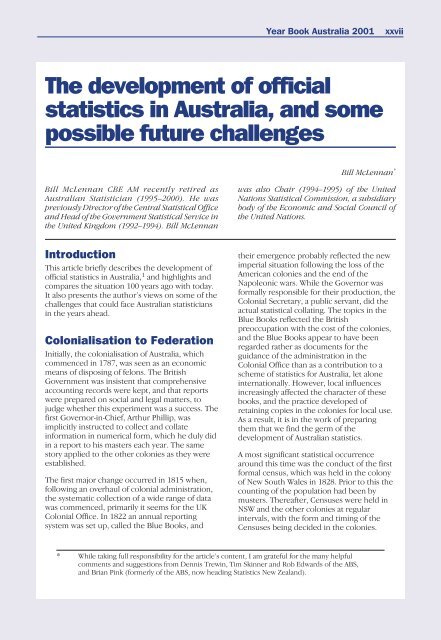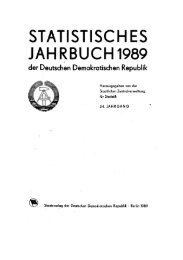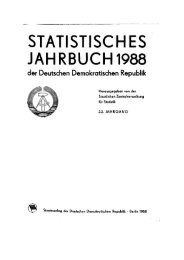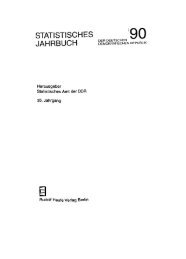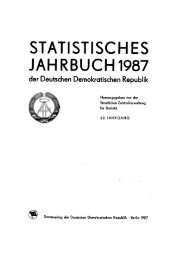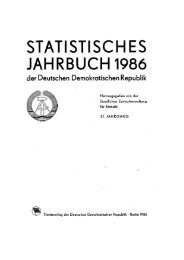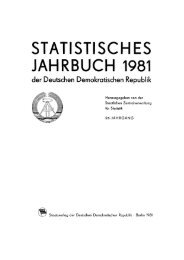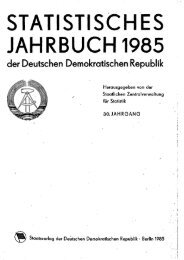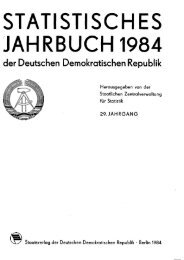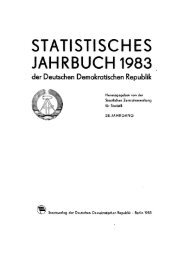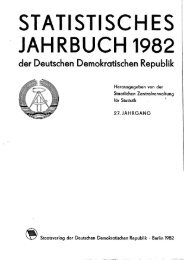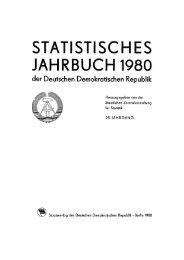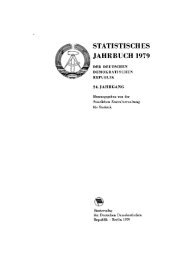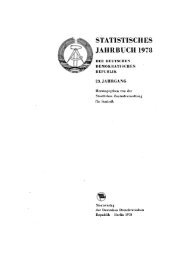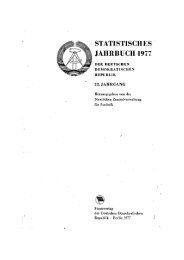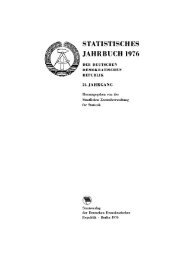- Page 1 and 2: 2001 YEAR BOOK AUSTRALIA
- Page 5: 2001 YEAR BOOK AUSTRALIA This editi
- Page 8 and 9: ISSN 0312-4746 © Commonwealth of A
- Page 10 and 11: 14 Environment 577 15 Agriculture 6
- Page 13 and 14: Year Book Australia 2001 ix Year Bo
- Page 32 and 33: xxviii Year Book Australia 2001 Sel
- Page 34 and 35: xxx Year Book Australia 2001 respon
- Page 36 and 37: xxxii Year Book Australia 2001 own
- Page 38 and 39: xxxiv Year Book Australia 2001 Conf
- Page 40 and 41: xxxvi Year Book Australia 2001 and
- Page 42 and 43: xxxviii Year Book Australia 2001 At
- Page 44 and 45: xl Year Book Australia 2001 by gove
- Page 47 and 48: Chapter 1 — Geography and climate
- Page 49 and 50: Chapter 1—Geography and climate 5
- Page 51 and 52: Chapter 1—Geography and climate 7
- Page 53 and 54: Chapter 1—Geography and climate 9
- Page 55 and 56: Chapter 1—Geography and climate 1
- Page 57 and 58: Chapter 1—Geography and climate 1
- Page 59 and 60: Chapter 1—Geography and climate 1
- Page 61 and 62: Chapter 1—Geography and climate 1
- Page 63 and 64: Chapter 1—Geography and climate 1
- Page 65 and 66:
Chapter 1—Geography and climate 2
- Page 67 and 68:
Chapter 1—Geography and climate 2
- Page 69 and 70:
Chapter 1—Geography and climate 2
- Page 71 and 72:
Chapter 1—Geography and climate 2
- Page 73 and 74:
Chapter 1—Geography and climate 2
- Page 75 and 76:
Chapter 1—Geography and climate 3
- Page 77 and 78:
Chapter 1—Geography and climate 3
- Page 79 and 80:
Chapter 1—Geography and climate 3
- Page 81 and 82:
Chapter 1—Geography and climate 3
- Page 83 and 84:
Chapter 1—Geography and climate 3
- Page 85 and 86:
Chapter 1—Geography and climate 4
- Page 87 and 88:
Chapter 1—Geography and climate 4
- Page 89 and 90:
Chapter 1—Geography and climate 4
- Page 91 and 92:
Chapter 1—Geography and climate 4
- Page 93 and 94:
Chapter 1—Geography and climate 4
- Page 95 and 96:
2 Government Introduction 53 Articl
- Page 97 and 98:
Chapter 2—Government 53 Introduct
- Page 99 and 100:
Chapter 2—Government 55 constitut
- Page 101 and 102:
Chapter 2—Government 57 Commonwea
- Page 103 and 104:
Chapter 2—Government 59 The Prime
- Page 105 and 106:
Chapter 2—Government 61 2.3 SECON
- Page 107 and 108:
Chapter 2—Government 63 Electorat
- Page 109 and 110:
Chapter 2—Government 65 2.6 COMMO
- Page 111 and 112:
Chapter 2—Government 67 2.11 OPPO
- Page 113 and 114:
Chapter 2—Government 69 through s
- Page 115 and 116:
Chapter 2—Government 71 Bibliogra
- Page 117 and 118:
Chapter 2—Government 73 South Aus
- Page 119 and 120:
Chapter 2—Government 75 internati
- Page 121 and 122:
Chapter 2—Government 77 The propo
- Page 123 and 124:
Chapter 2—Government 79 C3.7 COMP
- Page 125 and 126:
Chapter 2—Government 81 more rece
- Page 127 and 128:
Chapter 2—Government 83 In Victor
- Page 129 and 130:
Chapter 2—Government 85 This rati
- Page 131 and 132:
Chapter 2—Government 87 C3.14 PRO
- Page 133:
Chapter 2—Government 89 Sawer, Ma
- Page 136 and 137:
Emergency assistance 106 Other huma
- Page 138 and 139:
94 Year Book Australia 2001 Austral
- Page 140 and 141:
96 Year Book Australia 2001 mistake
- Page 142 and 143:
98 Year Book Australia 2001 economi
- Page 144 and 145:
100 Year Book Australia 2001 3.2 AU
- Page 146 and 147:
102 Year Book Australia 2001 Austra
- Page 148 and 149:
104 Year Book Australia 2001 contri
- Page 150 and 151:
106 Year Book Australia 2001 resour
- Page 152 and 153:
108 Year Book Australia 2001 of pov
- Page 154 and 155:
110 Year Book Australia 2001 3.7 AU
- Page 156 and 157:
112 Year Book Australia 2001 The De
- Page 158 and 159:
114 Year Book Australia 2001 Furthe
- Page 161 and 162:
Chapter 4—Defence 117 Introductio
- Page 163 and 164:
Chapter 4—Defence 119 meet all fu
- Page 165 and 166:
Chapter 4—Defence 121 4.3 DEFENCE
- Page 167 and 168:
Chapter 4—Defence 123 4.5 DEFENCE
- Page 169 and 170:
Chapter 4—Defence 125 4.11 MAJOR
- Page 171:
5 Population Introduction 129 Artic
- Page 174 and 175:
130 Year Book Australia 2001 start
- Page 176 and 177:
132 Year Book Australia 2001 5.3 PO
- Page 178 and 179:
134 Year Book Australia 2001 Crude
- Page 180 and 181:
136 Year Book Australia 2001 5.10 D
- Page 182 and 183:
138 Year Book Australia 2001 5.12 A
- Page 184 and 185:
140 Year Book Australia 2001 5.15 P
- Page 186 and 187:
142 Year Book Australia 2001 5.18 E
- Page 188 and 189:
144 Year Book Australia 2001 5.20 P
- Page 190 and 191:
146 Year Book Australia 2001 % 10 8
- Page 192 and 193:
148 Year Book Australia 2001 5.26 L
- Page 194 and 195:
150 Year Book Australia 2001 5.29 N
- Page 196 and 197:
152 Year Book Australia 2001 5.33 L
- Page 198 and 199:
154 Year Book Australia 2001 5.36 C
- Page 200 and 201:
156 Year Book Australia 2001 % 100
- Page 202 and 203:
158 Year Book Australia 2001 5.44 A
- Page 204 and 205:
160 Year Book Australia 2001 5.48 P
- Page 206 and 207:
162 Year Book Australia 2001 5.50 C
- Page 208 and 209:
164 Year Book Australia 2001 5.53 R
- Page 210 and 211:
166 Year Book Australia 2001 5.55 P
- Page 212 and 213:
168 Year Book Australia 2001 Coghla
- Page 214 and 215:
170 Year Book Australia 2001 averag
- Page 216 and 217:
172 Year Book Australia 2001 C4.4 N
- Page 218 and 219:
174 Year Book Australia 2001 the la
- Page 220 and 221:
176 Year Book Australia 2001 C4.11
- Page 222 and 223:
178 Year Book Australia 2001 Intern
- Page 224 and 225:
180 Year Book Australia 2001 United
- Page 226 and 227:
182 Year Book Australia 2001 C4.18c
- Page 228 and 229:
184 Year Book Australia 2001 C4.20a
- Page 230 and 231:
186 Year Book Australia 2001 worker
- Page 232 and 233:
188 Year Book Australia 2001 Turnin
- Page 234 and 235:
190 Year Book Australia 2001 In 190
- Page 236 and 237:
192 Year Book Australia 2001 C4.30
- Page 238 and 239:
194 Year Book Australia 2001 years.
- Page 240 and 241:
196 Year Book Australia 2001 The si
- Page 242 and 243:
198 Year Book Australia 2001 C4.37
- Page 244 and 245:
200 Year Book Australia 2001 C4.40a
- Page 246 and 247:
202 Year Book Australia 2001 Indeed
- Page 248 and 249:
204 Year Book Australia 2001 a decl
- Page 250 and 251:
206 Year Book Australia 2001 C4.46
- Page 252 and 253:
208 Year Book Australia 2001 Austra
- Page 254 and 255:
210 Year Book Australia 2001 Price,
- Page 257 and 258:
Chapter 6—Labour 213 Introduction
- Page 259 and 260:
Chapter 6—Labour 215 6.2 THE AUST
- Page 261 and 262:
Chapter 6—Labour 217 In 1999-2000
- Page 263 and 264:
Chapter 6—Labour 219 6.7 LABOUR F
- Page 265 and 266:
Chapter 6—Labour 221 Information
- Page 267 and 268:
Chapter 6—Labour 223 Persons unem
- Page 269 and 270:
Chapter 6—Labour 225 Job search e
- Page 271 and 272:
Chapter 6—Labour 227 6.19 JOB VAC
- Page 273 and 274:
Chapter 6—Labour 229 Characterist
- Page 275 and 276:
Chapter 6—Labour 231 Private sect
- Page 277 and 278:
Chapter 6—Labour 233 6.28 EMPLOYE
- Page 279 and 280:
Chapter 6—Labour 235 Occupation 6
- Page 281 and 282:
Chapter 6—Labour 237 State/Territ
- Page 283 and 284:
Chapter 6—Labour 239 6.36 EMPLOYE
- Page 285 and 286:
Chapter 6—Labour 241 6.40 WORKING
- Page 287 and 288:
Chapter 6—Labour 243 A century of
- Page 289 and 290:
Chapter 6—Labour 245 steadily, an
- Page 291:
Chapter 6—Labour 247 Bibliography
- Page 294 and 295:
Community support programs of the D
- Page 296 and 297:
252 Year Book Australia 2001 The mo
- Page 298 and 299:
254 Year Book Australia 2001 7.3 AL
- Page 300 and 301:
256 Year Book Australia 2001 7.5 IN
- Page 302 and 303:
258 Year Book Australia 2001 A job
- Page 304 and 305:
260 Year Book Australia 2001 7.9 RE
- Page 306 and 307:
262 Year Book Australia 2001 She mu
- Page 308 and 309:
264 Year Book Australia 2001 Jobs,
- Page 310 and 311:
266 Year Book Australia 2001 Centre
- Page 312 and 313:
268 Year Book Australia 2001 which
- Page 314 and 315:
270 Year Book Australia 2001 At Jun
- Page 316 and 317:
272 Year Book Australia 2001 Compen
- Page 318 and 319:
274 Year Book Australia 2001 7.19 V
- Page 320 and 321:
276 Year Book Australia 2001 death
- Page 322 and 323:
278 Year Book Australia 2001 7.24 V
- Page 324 and 325:
280 Year Book Australia 2001 Househ
- Page 326 and 327:
282 Year Book Australia 2001 form o
- Page 328 and 329:
284 Year Book Australia 2001 C5.2 T
- Page 330 and 331:
286 Year Book Australia 2001 The di
- Page 332 and 333:
288 Year Book Australia 2001 C5.6 C
- Page 334 and 335:
290 Year Book Australia 2001 welfar
- Page 336 and 337:
292 Year Book Australia 2001 C5.8 I
- Page 338 and 339:
294 Year Book Australia 2001 income
- Page 341:
8 Housing Introduction 299 Types of
- Page 344 and 345:
300 Year Book Australia 2001 8.1 DW
- Page 346 and 347:
302 Year Book Australia 2001 % 24 8
- Page 348 and 349:
304 Year Book Australia 2001 8.8 TE
- Page 350 and 351:
306 Year Book Australia 2001 Housin
- Page 352 and 353:
308 Year Book Australia 2001 Life c
- Page 354 and 355:
310 Year Book Australia 2001 of gro
- Page 356 and 357:
312 Year Book Australia 2001 8.16 P
- Page 358 and 359:
314 Year Book Australia 2001 Housin
- Page 360 and 361:
316 Year Book Australia 2001 undert
- Page 362 and 363:
318 Year Book Australia 2001 Housin
- Page 364 and 365:
320 Year Book Australia 2001 8.21 D
- Page 366 and 367:
322 Year Book Australia 2001 8.24 P
- Page 369 and 370:
9 Health Introduction 327 Health st
- Page 371 and 372:
Chapter 9—Health 327 Introduction
- Page 373 and 374:
Chapter 9—Health 329 Morbidity Th
- Page 375 and 376:
Chapter 9—Health 331 Causes of de
- Page 377 and 378:
Chapter 9—Health 333 9.7 AGE-STAN
- Page 379 and 380:
Chapter 9—Health 335 In 1998 card
- Page 381 and 382:
Chapter 9—Health 337 rate(b) 250
- Page 383 and 384:
Chapter 9—Health 339 The age-stan
- Page 385 and 386:
Chapter 9—Health 341 9.18 DIABETE
- Page 387 and 388:
Chapter 9—Health 343 9.20 PATIENT
- Page 389 and 390:
Chapter 9—Health 345 9.23 NATIONA
- Page 391 and 392:
Chapter 9—Health 347 9.25 CHARACT
- Page 393 and 394:
Chapter 9—Health 349 9.27 LEADING
- Page 395 and 396:
Chapter 9—Health 351 % 30 9.31 AU
- Page 397 and 398:
Chapter 9—Health 353 private pati
- Page 399 and 400:
Chapter 9—Health 355 Hospitals Pu
- Page 401 and 402:
Chapter 9—Health 357 In any year,
- Page 403 and 404:
Chapter 9—Health 359 before the
- Page 405 and 406:
Chapter 9—Health 361 9.39 EMPLOYE
- Page 407 and 408:
Chapter 9—Health 363 Health and W
- Page 409 and 410:
Chapter 9—Health 365 Bibliography
- Page 411 and 412:
Chapter 9—Health 367 World Health
- Page 413 and 414:
Chapter 9—Health 369 THE PRIVILEG
- Page 415 and 416:
Chapter 9—Health 371 C6.2 INFANT
- Page 417 and 418:
Chapter 9—Health 373 caused so ma
- Page 419 and 420:
Chapter 9—Health 375 0to4 5to14 1
- Page 421 and 422:
Chapter 9—Health 377 Mothers were
- Page 423 and 424:
Chapter 9—Health 379 There contin
- Page 425 and 426:
Chapter 9—Health 381 associated w
- Page 427 and 428:
Chapter 9—Health 383 C6.17 EX-NUP
- Page 429 and 430:
Chapter 9—Health 385 support syst
- Page 431 and 432:
Chapter 9—Health 387 C6.22 EMPLOY
- Page 433 and 434:
Chapter 9—Health 389 Schools, pre
- Page 435 and 436:
Chapter 9—Health 391 C6.27 DEATHS
- Page 437 and 438:
Chapter 9—Health 393 The special
- Page 439 and 440:
Chapter 9—Health 395 Governments
- Page 441 and 442:
Chapter 9—Health 397 Summary As w
- Page 443 and 444:
Chapter 9—Health 399 Human Rights
- Page 445 and 446:
10 Education and training Introduct
- Page 447 and 448:
Chapter 10—Education and training
- Page 449 and 450:
Chapter 10—Education and training
- Page 451 and 452:
Chapter 10—Education and training
- Page 453 and 454:
Chapter 10—Education and training
- Page 455 and 456:
Chapter 10—Education and training
- Page 457 and 458:
Chapter 10—Education and training
- Page 459 and 460:
Chapter 10—Education and training
- Page 461 and 462:
Chapter 10—Education and training
- Page 463 and 464:
Chapter 10—Education and training
- Page 465 and 466:
Chapter 10—Education and training
- Page 467 and 468:
Chapter 10—Education and training
- Page 469 and 470:
Chapter 10—Education and training
- Page 471 and 472:
Chapter 10—Education and training
- Page 473 and 474:
Chapter 10—Education and training
- Page 475 and 476:
Chapter 10—Education and training
- Page 477 and 478:
Chapter 10—Education and training
- Page 479 and 480:
Chapter 10—Education and training
- Page 481 and 482:
Chapter 10—Education and training
- Page 483 and 484:
Chapter 10—Education and training
- Page 485 and 486:
Chapter 10—Education and training
- Page 487 and 488:
Chapter 10—Education and training
- Page 489 and 490:
Chapter 10—Education and training
- Page 491:
11 Crime and justice Introduction 4
- Page 494 and 495:
450 Year Book Australia 2001 11.1 T
- Page 496 and 497:
452 Year Book Australia 2001 11.3 S
- Page 498 and 499:
454 Year Book Australia 2001 11.5 H
- Page 500 and 501:
456 Year Book Australia 2001 11.9 V
- Page 502 and 503:
458 Year Book Australia 2001 Select
- Page 504 and 505:
460 Year Book Australia 2001 11.15
- Page 506 and 507:
462 Year Book Australia 2001 11.18
- Page 508 and 509:
464 Year Book Australia 2001 The hi
- Page 510 and 511:
466 Year Book Australia 2001 11.22
- Page 512 and 513:
468 Year Book Australia 2001 11.24
- Page 514 and 515:
470 Year Book Australia 2001 11.27
- Page 516 and 517:
472 Year Book Australia 2001 11.31
- Page 518 and 519:
474 Year Book Australia 2001 the In
- Page 520 and 521:
476 Year Book Australia 2001 Intern
- Page 522 and 523:
478 Year Book Australia 2001 inform
- Page 524 and 525:
480 Year Book Australia 2001 rate(a
- Page 526 and 527:
482 Year Book Australia 2001 rate.(
- Page 528 and 529:
484 Year Book Australia 2001 There
- Page 530 and 531:
486 Year Book Australia 2001 rates(
- Page 532 and 533:
488 Year Book Australia 2001 1,727
- Page 534 and 535:
490 Year Book Australia 2001 Austra
- Page 536 and 537:
492 Year Book Australia 2001 “By
- Page 538 and 539:
494 Year Book Australia 2001 like c
- Page 541 and 542:
12 Culture and recreation Introduct
- Page 543 and 544:
Chapter 12—Culture and recreation
- Page 545 and 546:
Chapter 12—Culture and recreation
- Page 547 and 548:
Chapter 12—Culture and recreation
- Page 549 and 550:
Chapter 12—Culture and recreation
- Page 551 and 552:
Chapter 12—Culture and recreation
- Page 553 and 554:
Chapter 12—Culture and recreation
- Page 555 and 556:
Chapter 12—Culture and recreation
- Page 557 and 558:
Chapter 12—Culture and recreation
- Page 559 and 560:
Chapter 12—Culture and recreation
- Page 561 and 562:
Chapter 12—Culture and recreation
- Page 563 and 564:
Chapter 12—Culture and recreation
- Page 565 and 566:
Chapter 12—Culture and recreation
- Page 567 and 568:
Chapter 12—Culture and recreation
- Page 569 and 570:
Chapter 12—Culture and recreation
- Page 571 and 572:
Chapter 12—Culture and recreation
- Page 573 and 574:
Chapter 12—Culture and recreation
- Page 575 and 576:
Chapter 12—Culture and recreation
- Page 577 and 578:
Chapter 12—Culture and recreation
- Page 579 and 580:
Chapter 12—Culture and recreation
- Page 581 and 582:
Chapter 12—Culture and recreation
- Page 583 and 584:
Chapter 12—Culture and recreation
- Page 585 and 586:
Chapter 12—Culture and recreation
- Page 587 and 588:
Chapter 12—Culture and recreation
- Page 589 and 590:
Chapter 12—Culture and recreation
- Page 591 and 592:
Chapter 12—Culture and recreation
- Page 593 and 594:
Chapter 12—Culture and recreation
- Page 595 and 596:
Chapter 12—Culture and recreation
- Page 597 and 598:
Chapter 12—Culture and recreation
- Page 599 and 600:
Chapter 12—Culture and recreation
- Page 601 and 602:
Chapter 12—Culture and recreation
- Page 603 and 604:
Chapter 12—Culture and recreation
- Page 605:
Chapter 12—Culture and recreation
- Page 609 and 610:
Chapter 13—Industry overview 565
- Page 611 and 612:
Chapter 13—Industry overview 567
- Page 613 and 614:
Chapter 13—Industry overview 569
- Page 615 and 616:
Chapter 13—Industry overview 571
- Page 617 and 618:
Chapter 13—Industry overview 573
- Page 619:
Chapter 13—Industry overview 575
- Page 623 and 624:
Chapter 14—Environment 579 Introd
- Page 625 and 626:
Chapter 14—Environment 581 14.3 H
- Page 627 and 628:
Chapter 14—Environment 583 14.7 C
- Page 629 and 630:
Chapter 14—Environment 585 14.10
- Page 631 and 632:
Chapter 14—Environment 587 Efflue
- Page 633 and 634:
Chapter 14—Environment 589 Estima
- Page 635 and 636:
Chapter 14—Environment 591 14.19
- Page 637 and 638:
Chapter 14—Environment 593 In 199
- Page 639 and 640:
Chapter 14—Environment 595 14.25
- Page 641 and 642:
Chapter 14—Environment 597 Dampie
- Page 643 and 644:
Chapter 14—Environment 599 Aquacu
- Page 645 and 646:
Chapter 14—Environment 601 Manage
- Page 647 and 648:
Chapter 14—Environment 603 14.34
- Page 649 and 650:
Chapter 14—Environment 605 Biblio
- Page 651 and 652:
Chapter 14—Environment 607 —199
- Page 653 and 654:
15 Agriculture Introduction 611 Art
- Page 655 and 656:
Chapter 15—Agriculture 611 Introd
- Page 657 and 658:
Chapter 15—Agriculture 613 § Pou
- Page 659 and 660:
Chapter 15—Agriculture 615 New So
- Page 661 and 662:
Chapter 15—Agriculture 617 climat
- Page 663 and 664:
Chapter 15—Agriculture 619 15.4 E
- Page 665 and 666:
Chapter 15—Agriculture 621 Gross
- Page 667 and 668:
Chapter 15—Agriculture 623 15.9 F
- Page 669 and 670:
Chapter 15—Agriculture 625 Crops
- Page 671 and 672:
Chapter 15—Agriculture 627 15.16
- Page 673 and 674:
Chapter 15—Agriculture 629 15.19
- Page 675 and 676:
Chapter 15—Agriculture 631 15.22
- Page 677 and 678:
Chapter 15—Agriculture 633 Fruit
- Page 679 and 680:
Chapter 15—Agriculture 635 Cotton
- Page 681 and 682:
Chapter 15—Agriculture 637 15.36
- Page 683 and 684:
Chapter 15—Agriculture 639 expand
- Page 685 and 686:
Chapter 15—Agriculture 641 Pigs P
- Page 687 and 688:
Chapter 15—Agriculture 643 15.47
- Page 689 and 690:
Chapter 15—Agriculture 645 Sheep
- Page 691:
Chapter 15—Agriculture 647 Biblio
- Page 694 and 695:
Fishing 659 Fisheries resources 659
- Page 696 and 697:
652 Year Book Australia 2001 16.1 N
- Page 698 and 699:
654 Year Book Australia 2001 In Oct
- Page 700 and 701:
656 Year Book Australia 2001 Timber
- Page 702 and 703:
658 Year Book Australia 2001 the NF
- Page 704 and 705:
660 Year Book Australia 2001 16.5 S
- Page 706 and 707:
662 Year Book Australia 2001 16.8 G
- Page 708 and 709:
664 Year Book Australia 2001 The to
- Page 710 and 711:
666 Year Book Australia 2001 Austra
- Page 712 and 713:
668 Year Book Australia 2001 Biblio
- Page 714 and 715:
Research 686 Australian Geological
- Page 716 and 717:
672 Year Book Australia 2001 the in
- Page 718 and 719:
674 Year Book Australia 2001 large-
- Page 720 and 721:
676 Year Book Australia 2001 The Na
- Page 722 and 723:
678 Year Book Australia 2001 Export
- Page 724 and 725:
680 Year Book Australia 2001 Large
- Page 726 and 727:
682 Year Book Australia 2001 Despit
- Page 728 and 729:
684 Year Book Australia 2001 Minera
- Page 730 and 731:
686 Year Book Australia 2001 17.9 P
- Page 732 and 733:
688 Year Book Australia 2001 up-to-
- Page 735:
18 Energy Introduction 693 Energy r
- Page 738 and 739:
694 Year Book Australia 2001 Over t
- Page 740 and 741:
696 Year Book Australia 2001 Austra
- Page 742 and 743:
698 Year Book Australia 2001 18.7 A
- Page 744 and 745:
700 Year Book Australia 2001 Energy
- Page 746 and 747:
702 Year Book Australia 2001 18.14
- Page 748 and 749:
704 Year Book Australia 2001 Greenp
- Page 750 and 751:
706 Year Book Australia 2001 especi
- Page 752 and 753:
708 Year Book Australia 2001 State
- Page 755 and 756:
Chapter 19—Manufacturing 711 Intr
- Page 757 and 758:
Chapter 19—Manufacturing 713 good
- Page 759 and 760:
Chapter 19—Manufacturing 715 Manu
- Page 761 and 762:
Chapter 19—Manufacturing 717 19.5
- Page 763 and 764:
Chapter 19—Manufacturing 719 19.8
- Page 765 and 766:
Chapter 19—Manufacturing 721 19.1
- Page 767 and 768:
Chapter 19—Manufacturing 723 19.1
- Page 769 and 770:
Chapter 19—Manufacturing 725 19.1
- Page 771:
Chapter 19—Manufacturing 727 Bibl
- Page 775 and 776:
Chapter 20—Construction 731 Intro
- Page 777 and 778:
Chapter 20—Construction 733 20.3
- Page 779 and 780:
Chapter 20—Construction 735 More
- Page 781 and 782:
Chapter 20—Construction 737 20.12
- Page 783 and 784:
Chapter 20—Construction 739 In 19
- Page 785 and 786:
Chapter 20—Construction 741 20.17
- Page 787 and 788:
Chapter 20—Construction 743 Indus
- Page 789:
Chapter 20—Construction 745 Bibli
- Page 792 and 793:
Film industry 776 Film and video pr
- Page 794 and 795:
750 Year Book Australia 2001 21.2 G
- Page 796 and 797:
752 Year Book Australia 2001 21.4 A
- Page 798 and 799:
754 Year Book Australia 2001 21.7 R
- Page 800 and 801:
756 Year Book Australia 2001 Clubs,
- Page 802 and 803:
758 Year Book Australia 2001 In con
- Page 804 and 805:
760 Year Book Australia 2001 During
- Page 806 and 807:
762 Year Book Australia 2001 21.18
- Page 808 and 809:
764 Year Book Australia 2001 21.21
- Page 810 and 811:
766 Year Book Australia 2001 At the
- Page 812 and 813:
768 Year Book Australia 2001 21.26
- Page 814 and 815:
770 Year Book Australia 2001 21.29
- Page 816 and 817:
772 Year Book Australia 2001 21.32
- Page 818 and 819:
774 Year Book Australia 2001 21.35
- Page 820 and 821:
776 Year Book Australia 2001 Film i
- Page 822 and 823:
778 Year Book Australia 2001 21.40
- Page 824 and 825:
780 Year Book Australia 2001 The in
- Page 826 and 827:
782 Year Book Australia 2001 Small
- Page 829 and 830:
Chapter 22—Tourism 785 Introducti
- Page 831 and 832:
Chapter 22—Tourism 787 22.2 VISIT
- Page 833 and 834:
Chapter 22—Tourism 789 22.6 INBOU
- Page 835 and 836:
Chapter 22—Tourism 791 After paym
- Page 837 and 838:
Chapter 22—Tourism 793 trips for
- Page 839 and 840:
Chapter 22—Tourism 795 Tourist ac
- Page 841:
Chapter 22—Tourism 797 Bibliograp
- Page 844 and 845:
Drivers’ and riders’ licences 8
- Page 846 and 847:
802 Year Book Australia 2001 23.2 A
- Page 848 and 849:
804 Year Book Australia 2001 Domest
- Page 850 and 851:
806 Year Book Australia 2001 23.10
- Page 852 and 853:
808 Year Book Australia 2001 23.15
- Page 854 and 855:
810 Year Book Australia 2001 Year 2
- Page 856 and 857:
812 Year Book Australia 2001 23.21
- Page 858 and 859:
814 Year Book Australia 2001 the ye
- Page 860 and 861:
816 Year Book Australia 2001 23.28
- Page 862 and 863:
818 Year Book Australia 2001 Table
- Page 864 and 865:
820 Year Book Australia 2001 horsep
- Page 866 and 867:
822 Year Book Australia 2001 Transp
- Page 868 and 869:
824 Year Book Australia 2001 meetin
- Page 871:
24 Communications and information t
- Page 874 and 875:
830 Year Book Australia 2001 were w
- Page 876 and 877:
832 Year Book Australia 2001 possib
- Page 878 and 879:
834 Year Book Australia 2001 Broadc
- Page 880 and 881:
836 Year Book Australia 2001 24.3 I
- Page 882 and 883:
838 Year Book Australia 2001 24.4 T
- Page 884 and 885:
840 Year Book Australia 2001 24.8 S
- Page 886 and 887:
842 Year Book Australia 2001 May 19
- Page 888 and 889:
844 Year Book Australia 2001 24.16
- Page 891:
25 Science and innovation Introduct
- Page 894 and 895:
850 Year Book Australia 2001 Expend
- Page 896 and 897:
852 Year Book Australia 2001 25.6 B
- Page 898 and 899:
854 Year Book Australia 2001 In ter
- Page 900 and 901:
856 Year Book Australia 2001 25.10
- Page 902 and 903:
858 Year Book Australia 2001 In ter
- Page 904 and 905:
860 Year Book Australia 2001 25.14
- Page 906 and 907:
862 Year Book Australia 2001 Offici
- Page 908 and 909:
864 Year Book Australia 2001 Biblio
- Page 910 and 911:
866 Year Book Australia 2001 stump-
- Page 912 and 913:
868 Year Book Australia 2001 Resear
- Page 914 and 915:
870 Year Book Australia 2001 pleuro
- Page 916 and 917:
872 Year Book Australia 2001 Resear
- Page 918 and 919:
874 Year Book Australia 2001 and re
- Page 920 and 921:
876 Year Book Australia 2001 system
- Page 922 and 923:
878 Year Book Australia 2001 high t
- Page 925:
26 Financial system Introduction 88
- Page 928 and 929:
884 Year Book Australia 2001 26.1 I
- Page 930 and 931:
886 Year Book Australia 2001 26.3 R
- Page 932 and 933:
888 Year Book Australia 2001 Life i
- Page 934 and 935:
890 Year Book Australia 2001 26.9 O
- Page 936 and 937:
892 Year Book Australia 2001 26.11
- Page 938 and 939:
894 Year Book Australia 2001 Stock
- Page 940 and 941:
896 Year Book Australia 2001 26.17
- Page 942 and 943:
898 Year Book Australia 2001 26.19
- Page 944 and 945:
900 Year Book Australia 2001 comm
- Page 946 and 947:
902 Year Book Australia 2001 Lendin
- Page 948 and 949:
904 Year Book Australia 2001 Money
- Page 950 and 951:
906 Year Book Australia 2001 1901 i
- Page 952 and 953:
908 Year Book Australia 2001 their
- Page 954 and 955:
910 Year Book Australia 2001 Financ
- Page 956 and 957:
912 Year Book Australia 2001 26.44
- Page 959:
27 Government finance Introduction
- Page 962 and 963:
918 Year Book Australia 2001 muni
- Page 964 and 965:
920 Year Book Australia 2001 operat
- Page 966 and 967:
922 Year Book Australia 2001 27.1 M
- Page 968 and 969:
924 Year Book Australia 2001 Genera
- Page 970 and 971:
926 Year Book Australia 2001 27.6 A
- Page 972 and 973:
928 Year Book Australia 2001 27.8 S
- Page 974 and 975:
930 Year Book Australia 2001 27.11
- Page 976 and 977:
932 Year Book Australia 2001 27.13
- Page 978 and 979:
934 Year Book Australia 2001 27.15
- Page 980 and 981:
936 Year Book Australia 2001 27.17
- Page 982 and 983:
938 Year Book Australia 2001 Taxati
- Page 984 and 985:
940 Year Book Australia 2001 State
- Page 987:
28 Prices Introduction 945 Consumer
- Page 990 and 991:
946 Year Book Australia 2001 of goo
- Page 992 and 993:
948 Year Book Australia 2001 Price
- Page 994 and 995:
950 Year Book Australia 2001 28.5 R
- Page 996 and 997:
952 Year Book Australia 2001 A look
- Page 998 and 999:
954 Year Book Australia 2001 The ne
- Page 1000 and 1001:
956 Year Book Australia 2001 28.9 P
- Page 1002 and 1003:
958 Year Book Australia 2001 28.12
- Page 1004 and 1005:
960 Year Book Australia 2001 28.14
- Page 1006 and 1007:
962 Year Book Australia 2001 This i
- Page 1008 and 1009:
964 Year Book Australia 2001 Biblio
- Page 1011:
29 National accounts Introduction 9
- Page 1014 and 1015:
970 Year Book Australia 2001 Histor
- Page 1016 and 1017:
972 Year Book Australia 2001 29.1 G
- Page 1018 and 1019:
974 Year Book Australia 2001 12 Wal
- Page 1020 and 1021:
976 Year Book Australia 2001 Chain
- Page 1022 and 1023:
978 Year Book Australia 2001 29.5 G
- Page 1024 and 1025:
980 Year Book Australia 2001 29.8 W
- Page 1026 and 1027:
982 Year Book Australia 2001 29.11
- Page 1028 and 1029:
984 Year Book Australia 2001 29.14
- Page 1030 and 1031:
986 Year Book Australia 2001 29.17
- Page 1032 and 1033:
988 Year Book Australia 2001 29.21
- Page 1034 and 1035:
990 Year Book Australia 2001 29.22
- Page 1036 and 1037:
992 Year Book Australia 2001 Financ
- Page 1038 and 1039:
994 Year Book Australia 2001 29.25
- Page 1040 and 1041:
996 Year Book Australia 2001 Biblio
- Page 1043 and 1044:
Chapter 30—International accounts
- Page 1045 and 1046:
Chapter 30—International accounts
- Page 1047 and 1048:
Chapter 30—International accounts
- Page 1049 and 1050:
Chapter 30—International accounts
- Page 1051 and 1052:
Chapter 30—International accounts
- Page 1053 and 1054:
Chapter 30—International accounts
- Page 1055 and 1056:
Chapter 30—International accounts
- Page 1057 and 1058:
Chapter 30—International accounts
- Page 1059 and 1060:
Chapter 30—International accounts
- Page 1061 and 1062:
Chapter 30—International accounts
- Page 1063 and 1064:
Chapter 30—International accounts
- Page 1065 and 1066:
Chapter 30—International accounts
- Page 1067 and 1068:
Chapter 30—International accounts
- Page 1069 and 1070:
Chapter 30—International accounts
- Page 1071 and 1072:
Chapter 30—International accounts
- Page 1073 and 1074:
Chapter 30—International accounts
- Page 1075 and 1076:
Chapter 30—International accounts
- Page 1077 and 1078:
Chapter 30—International accounts
- Page 1079 and 1080:
Chapter 30—International accounts
- Page 1081 and 1082:
Chapter 30—International accounts
- Page 1083 and 1084:
Chapter 30—International accounts
- Page 1085:
Chapter 30—International accounts
- Page 1088 and 1089:
1044 Year Book Australia 2001 Gambl
- Page 1090 and 1091:
1046 Year Book Australia 2001 Depar
- Page 1093:
FOR MORE INFORMATION... INTERNET LI
- Page 1096 and 1097:
1052 Year Book Australia 2001 agein
- Page 1098 and 1099:
1054 Year Book Australia 2001 Austr
- Page 1100 and 1101:
1056 Year Book Australia 2001 gover
- Page 1102 and 1103:
1058 Year Book Australia 2001 const
- Page 1104 and 1105:
1060 Year Book Australia 2001 conce
- Page 1106 and 1107:
1062 Year Book Australia 2001 Depar
- Page 1108 and 1109:
1064 Year Book Australia 2001 envir
- Page 1110 and 1111:
1066 Year Book Australia 2001 fossi
- Page 1112 and 1113:
1068 Year Book Australia 2001 price
- Page 1114 and 1115:
1070 Year Book Australia 2001 India
- Page 1116 and 1117:
1072 Year Book Australia 2001 Jones
- Page 1118 and 1119:
1074 Year Book Australia 2001 maize
- Page 1120 and 1121:
1076 Year Book Australia 2001 Murru
- Page 1122 and 1123:
1078 Year Book Australia 2001 older
- Page 1124 and 1125:
1080 Year Book Australia 2001 pneum
- Page 1126 and 1127:
1082 Year Book Australia 2001 rando
- Page 1128 and 1129:
1084 Year Book Australia 2001 Secon
- Page 1130 and 1131:
1086 Year Book Australia 2001 cultu
- Page 1132 and 1133:
1088 Year Book Australia 2001 crimi
- Page 1134 and 1135:
1090 Year Book Australia 2001 optom
- Page 1143:
Recommended retail price $80.00 ©


